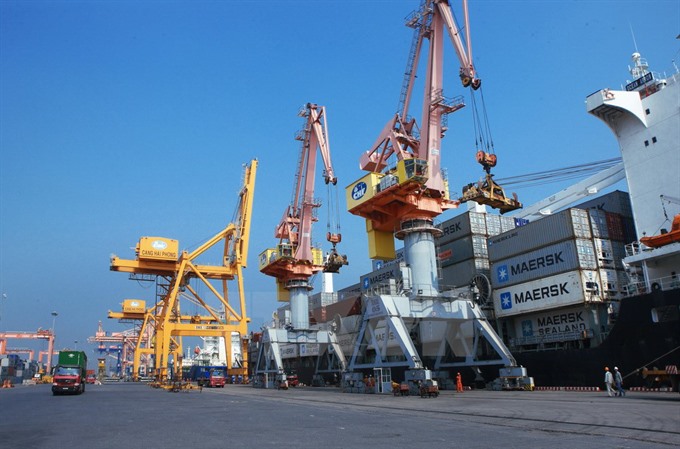 Economy
Economy

The Manila-based Asian Development Bank (ADB) has projected the economic growth of Việt Nam will be 6.3 per cent this year, taking 0.2 percentage points off from the previous forecast.
 |
| Tân Vũ Port. The Asian Development Bank forecast Vietnamese economic growth at 6.3 per cent this year. — VNA/VNS Photo Lâm Khánh |
HÀ NỘI — The Asian Development Bank (ADB) has projected the economic growth of Việt Nam will be 6.3 per cent this year, taking 0.2 percentage points off from the previous forecast.
This is followed by a projected growth of 6.5 per cent in 2018.
However, the Vietnamese economy continued to perform well despite several setbacks, the ADB said in the Asian Development Outlook Update 2017, which was launched on Tuesday in Hà Nội.
“Despite the drop in mining and oil output, the rest of the Vietnamese economy has continued to perform well, driven by its twin engines of export-orientated manufacturing and rising domestic consumption,” said Eric Sidgwick, ADB Country Director for Việt Nam, at a conference in Hà Nội.
“Manufacturing expanded by 10.5 per cent in the first half of the year, as new foreign-invested factories ramped up production, while the services sector continued to pick up steam as a result of rising retail trade, growing bank lending and a 30 per cent jump in tourism arrivals,” he said.
Sidgwick said Việt Nam’s economic growth was expected to rise in the second half of this year, buoyed by further increases in foreign direct investment and exports, domestic credit growth, a further recovery in agriculture from the 2016 drought and accelerating disbursements of capital expenditure on national infrastructure programmes.
However, the report stressed that while Việt Nam’s economy remained bright, two emerging policy challenges would need to be addressed to ensure growth remained sustainable. Sidgwick said that the first challenge related to the authorities’ efforts to reduce the fiscal deficit. The report said that recent progress in trimming the budget deficit was commendable; it led to a drop in capital spending which if not rebalanced could erode Việt Nam’s long-term performance.
ADB said the authorities might focus on adopting additional taxation measures while cutting non-core pubic expenditures such as administrative expenses.
Sidgwick said the second challenge related to recent moves to bring down interest rates and raise already strong bank lending growth. ADB said that in the report, cutting interest rates to historical lows had the potential to increase financial sector risks, given the large stock of past, unresolved bad debts.
It would be vital to strengthen regulations and supervision on loan quality and to continue the introduction of more stringent (Basel 2) regulatory standards over the next 12-18 months, the bank said.
The report said it was critical to relax current tight controls on foreign ownership to effectively resolve bad debts.
Inflation was projected slightly higher than foreseen in April, fueled by the recent interest rate cuts, buoyant domestic demand and strong GDP growth. Planned increases in fees for public education and health care will exert additional upward pressure on inflation. For the full year, average inflation was expected to reach 4.5 per cent, rising further to 5.5 per cent in 2018, half percentage point higher than April forecasts in each case, according to the report.
The Vietnamese Government set a goal of GDP growth at 6.7 per cent this year. To achieve this goal, GDP growth in the second half of this year must reach 7.42 per cent – a significant rate. — VNS




